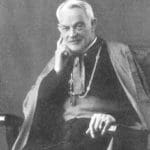THE BENEDICTUS: Part II of II
“And thou, child, shalt be called the prophet of the Highest, for thou shalt go before the face of the Lord to prepare His ways. To give knowledge of salvation to His people unto the remission of their sins. Through the bowels of the mercy of our God, in which the orient from on high hath visited us. To enlighten them that sit in darkness, and in the shadow of death, to direct our feet into the way of peace.’ And the child grew, and was strengthened in spirit, and was in the desert until the day of his manifestation to Israel.”
Luke 1:76-80.
1. The first part of the Benedictus develops the last part of the Magnificat; this second part develops the words of the Angel Gabriel to Zachary: “We shall go before him in the spirit and power of Elijah, that he may turn the hearts of the fathers unto the children, and the incredulous to the wisdom of the just, to prepare unto the Lord a perfect people.” John was to be the forerunner of our Lord; he was to prepare the people for His coming; he was to prepare it by means of penance; and when he had prepared it he was to point out to men our Lord Himself among them. Though apparently he was to work no miracle, though he was to make no striking prophecy, he was to be “a prophet and more than a prophet” on the testimony of our Lord Himself; it was enough that he was to show the people the way to the remission of their sins by means of that salvation, that Saviour, the Lamb of God, Who was among them. St. John is the ideal apostle.
2. “Through the bowels of the mercy of God.” In these last verses Zachary shows how much he belongs to the spirit of the new law. He recognizes the sin of man; he sees their remission in the Saviour Jesus Christ; he recognizes that this remission is nothing of right, but is a pure condescension of God; he concludes, with tears in his uplifted eyes, that this condescension can be prompted by nothing but mercy and love; he anticipates in his own gentle way the cry of  St. Paul: “Christ loved me, and gave Himself for me.” “God might have had mercy in a thousand ways. But the way He has chosen was the way of this visitation, for love is not content with mercy. It must itself share the low condition of those it loves, and this has issued in God becoming Man.” The old man is overwhelmed with the thought that has grown upon him in these three months, and well may the thought overwhelm us all.
St. Paul: “Christ loved me, and gave Himself for me.” “God might have had mercy in a thousand ways. But the way He has chosen was the way of this visitation, for love is not content with mercy. It must itself share the low condition of those it loves, and this has issued in God becoming Man.” The old man is overwhelmed with the thought that has grown upon him in these three months, and well may the thought overwhelm us all.
3. “And the child grew, and was strengthened in spirit, and was in the deserts until the day of his manifestation unto Israel.” This is all we are told of the training of St. John. But it is not nothing; above all it tells us one thing. He was “in the desert.” So our Lord Himself went into the desert. So St. Paul retired into the desert. The desert, it is abundantly proved, is the best school for the apostolate. We peer into the darkness and discover St. John, in prayer, in mortification, in self-suppression, forcing his way, as it were, through the valley of this death into the presence of God; in that presence learning things which it is not given to man to express; from that presence looking back on mankind, and thereby understanding with a depth that passes man’s own comprehension. So does an apostle gain all by losing all, live by death, confound the strong by his own worldly weakness.
Summary Meditation Points:
1. The mission of John was that of the ideal apostle; to prepare man, and to lead him to Jesus Christ, through contrition and penance.
2. Thence in the study of Jesus Christ we discover the motive of His condescension, which is that of pure love.
3. And John was himself to learn these things, both his mission and man to whom he was to be sent, by life alone in the wilderness.
 Editor’s Note: This meditation is from Archbishop Alban Goodier’s “The Prince of Peace” (1913).
Editor’s Note: This meditation is from Archbishop Alban Goodier’s “The Prince of Peace” (1913).
Art: Detail from Saint Jean Baptiste prêchant devant Hérode [St John the Baptist Preaching before Herod], Pieter de Grebber, 17th century, PD-US, Wikimedia Commons. Mirror of Archbishop Alban Goodier, S.J., www.stmaryscadoganstreet.co.uk, all rights reserved, used with permission.




